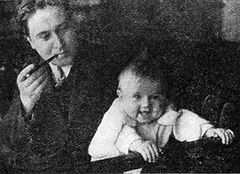Jaroslav Seifert
Jaroslav Seifert | |
|---|---|
 Jaroslav Seifert 1981 photo Hana Hamplová | |
| Born | 23 September 1901 Žižkov, Austria-Hungary |
| Died | 10 January 1986 (aged 84) Prague, Czechoslovakia |
| Occupation | Writer, poet, journalist |
| Nationality | Czech |
| Notable awards | Nobel Prize in Literature 1984 |
| Signature | |
 | |
Jaroslav Seifert (Czech pronunciation: [ˈjaroslaf ˈsajfr̩t] ⓘ; 23 September 1901 – 10 January 1986) was a Nobel Prize–winning Czechoslovak writer, poet and journalist.
Born in Žižkov, a suburb of Prague in what was then part of Austria-Hungary, his first collection of poems was published in 1921. He was a member of the Communist Party of Czechoslovakia (KSČ), the editor of a number of communist newspapers and magazines – Rovnost, Sršatec, and Reflektor – and the employee of a communist publishing house.
During the 1920s he was considered a leading representative of the Czechoslovakian artistic avant-garde. He was one of the founders of the journal Devětsil. In March 1929, he and six other writers left the KSČ after signing a manifesto protesting against Bolshevik tendencies in the new leadership of the party. He subsequently worked as a journalist in the social-democratic and trade union press during the 1930s and 1940s.
In 1949 Seifert left journalism and began to devote himself exclusively to literature. His poetry was awarded important state prizes in 1936, 1955, and 1968, and in 1967 he was designated National Artist. He was the official Chairman of the Czechoslovak Writer's Union for several years (1968–70). In 1977 he was one of the signatories of Charter 77 in opposition to the government of the Czechoslovak Socialist Republic. [citation needed]
Seifert was awarded the Nobel Prize in Literature in 1984. Due to bad health, he was not present at the award ceremony, and so his daughter received the Nobel Prize in his name. Even though it was a matter of great importance, there was only a brief remark of the award in the state-controlled media. He died in 1986, aged 84, and was buried at the municipal cemetery in Kralupy nad Vltavou (where his maternal grandparents originated from).
His burial was marked by a high presence of secret police, who tried to suppress any hint of dissent on the part of mourners.[1]
Works

- Město v slzách (1921)
- Samá láska (1923)
- Na vlnách TSF (1925)
- Slavík zpívá špatně (1926)
- Básně (1929)
- Poštovní holub (1929)
- Hvězdy nad Rajskou zahradou (1929)
- Jablko z klína (1933)
- Ruce Venušiny (1936)
- Jaro, sbohem (1937)
- Zhasněte světla (1938)
- Vějíř Boženy Němcové (1940)
- Světlem oděná (1940)
- Kamenný most (1944)
- Přilba z hlíny (1945)
- Ruka a plamen (1948)
- Šel malíř chudě do světa (1949)
- Píseň o Viktorce (1950)
- Maminka (1954)
- Chlapec a hvězdy (1956)
- Praha a Věnec sonetů (1956). English translation "A Wreath of Sonnets," translated by Jan Křesadlo.
- Zrnka révy (1965)
- Koncert na ostrově (1965)
- Odlévání zvonů (1967)
- Halleyova kometa (1967)
- Kniha o Praze (1968)
- Morový sloup (1968–1970)
- Deštník z Picadilly (1979)
- Všecky krásy světa (1979)
- Býti básníkem (1983)
References
External links
- Nobel biography
- Photos
- Biography (in Czech)
- Authorised English translation of Seifert's crown of sonnets by Jan Křesadlo
- The Poetry of Jaroslav Seifert Translated by Edward[sic] Osers
- Jaroslav Seifert – Poetry
- Jaroslav Seifert eNotes
- Timeline of Nobel Winners
